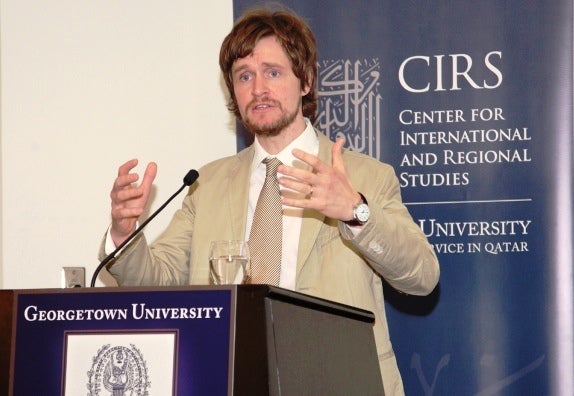American Studies, Dialogue Series, Race & Society, Regional Studies
Michael Driessen on the Role of Religion in Modern Democracies

Michael Driessen, a 2011-2012 Postdoctoral Fellow at CIRS and Assistant Professor of Political Science and International Affairs at John Cabot University, gave a CIRS Monthly Dialogue Lecture on “Religion-State Institutions and Patterns of Democracy: Religious Revivals and Secular Politics in Catholic and Muslim Societies” on April 24, 2012. The lecture was geared towards analyzing the relationship between religion and state politics in modern contemporary democracies and explored the question: “What does religiously friendly democratization look like?” in both Muslim and Catholic societies. Driessen explored the idea of religiously-friendly democracies and religiously-friendly democratization processes that occur in different political, social, and cultural contexts.
Driessen began the lecture by recalling the beginnings of the 2011 Arab Spring in the Middle East and North Africa and the prospects of increasing democracy in the region promised by these popular uprisings. This situation, however, was complicated by the election of Islamist-oriented political parties across the region. Driessen argued that “some of the dynamics that are seen to unfold in places like Egypt and Tunisia today are not so unique to Islam or so unique to Muslim-majority countries.”
Historically, opposition to democratic ideas and institutions by Catholic and Muslim political movements shared similar intuitions about the ideal role of religious authority in society. In contemporary scholarship on religion and politics, Driessen said, it is important to ask: “What kind of religion-state arrangements are actually possible in democracies?” One form of governance that does not adhere to strict religious or secular ideals and that does not treat these two seemingly opposing ideologies as mutually exclusive is the middle-ground of a religiously-friendly democracy. This combination of religion and democratic politics is capable of transforming the parameters of the struggle between religious and secular worldviews by relaxing the boundaries between religion and state. Religiously-friendly democracies define a situation where “neither religious actors nor the state can have power to coerce individual religious beliefs or individual religious identities in a democracy,” and where “unelected religious authorities cannot overturn or veto decisions made by elected political representatives,” he said.
Religiously-friendly democratization can be characterized by two interacting dynamics: increased political secularization in overtly religious societies on the one hand and religious-revival in overtly secular societies on the other. In some situations, “religious parties will often reach out to less religious and non-religious parties to reach out to a wider electorate in order to establish alliances with non-religious parties and, in doing so, they de-emphasize some of the most exclusive religious aspects of their ideology,” Driessen argued. This does not necessarily mean that the importance of religion fades, but that there is a platform of negotiation between the role of religion and other everyday concerns regarding economic goods and political beliefs. In this sense, “democracy empowers individuals; it allows for religious competition to take place and makes non-religious choices available and possible for individuals.” On the other hand, democracies can also promote and symbolically identify with religious symbols, values, and ideas by synchronizing national and holidays to national holidays and providing religious education in schools. Through these measures, “states socialize citizens into a national religious identity and in doing so push forward and help regenerate the connection between religion and the state,” he said.
Concluding the lecture, Driessen argued that religiously-friendly democracy helps to break the vicious cycle of religion and politics and “creates a different set of patterns for religious identities and the future of religious politics in dare I say, post-secular societies.”
Michael Driessen holds a Ph.D. in Political Science from the University of Notre Dame. He is finishing a book manuscript on “Religiously Friendly Democratization Processes” in the Mediterranean region that analyzes how religion-state arrangements help frame questions of religious and political identity in Muslim and Catholic societies.
Article by Suzi Mirgani, Manager and Editor for CIRS Publications